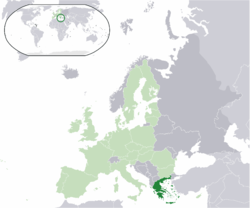Greece: Police Fire Tear Gas To Disperse Protesters
By RFE RL
(RFE/RL) — Greek police have used tear gas and pepper spray against protesters throwing stones and Molotov cocktails in Athens, as tens of thousands demonstrated in the Greek capital and other cities against new austerity measures.
The cuts are a precondition for securing the next tranche of financial aid from the European Union and International Monetary Fund, which heavily indebted Greece needs to avoid bankruptcy.
In downtown Athens, protesters set fire to trees around the parliament square and smashed paving stones and marble panels, which they threw against the riot police.

More than 50,000 people marched earlier on September 26 in Athens and Thessaloniki as public- and private-sector workers walked off their jobs in a 24-hour general strike called by the two biggest unions.
The action is the first general strike since the country’s three-party coalition government was formed in June.
Public opposition to the austerity measures is very strong in all walks of life, as the country already faces record unemployment and many Greeks have been forced under the poverty threshold.
“The measures that the three-party government are taking are unacceptable,” said Marinos Kazakis, a private businessman from Athens, “and the people need to understand that without a fight, they will never accomplish anything. [Otherwise], this is a one-way street.”
Tourist Sites Closed
The strike on September 26 also affected the country’s critical tourism sector. The Acropolis, Greece’s most famous tourist site, was shut down, while flights were halted for hours.
“We have come all the way from Australia to see these lovely, ancient ruins, and its closed on the one day that we have come here,” one tourist said. “It’s terrible.”
Greece has received 230 billion euros ($296 billion) in international financial aid since May 2010. Without foreign aid, the country would face a chaotic default on its debts and possibly be forced to leave the 17-country eurozone.
The country’s lenders have demanded more fiscal reforms if they are to continue issuing more rescue bailouts. The next payment of 31 billion euros hinges on the government agreeing to further cuts.
